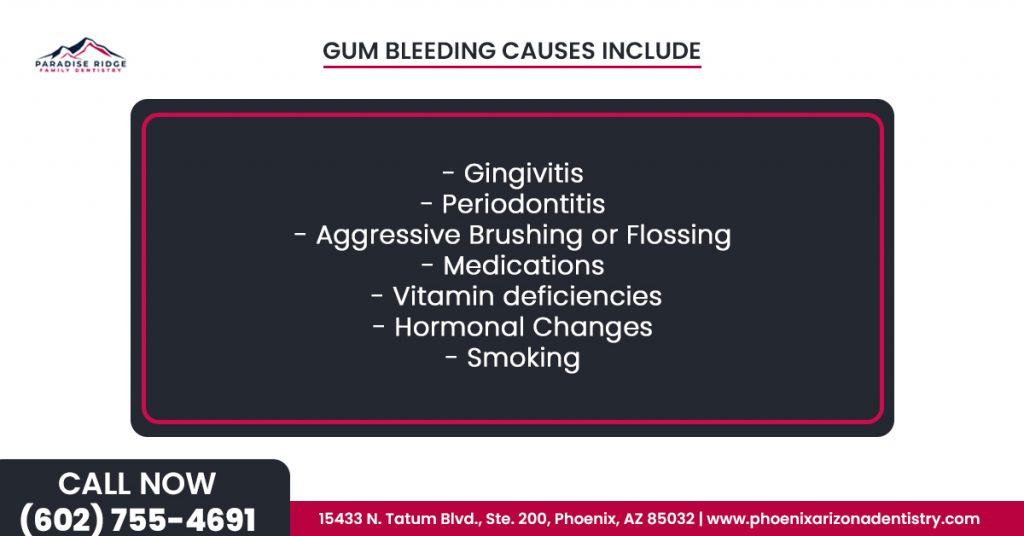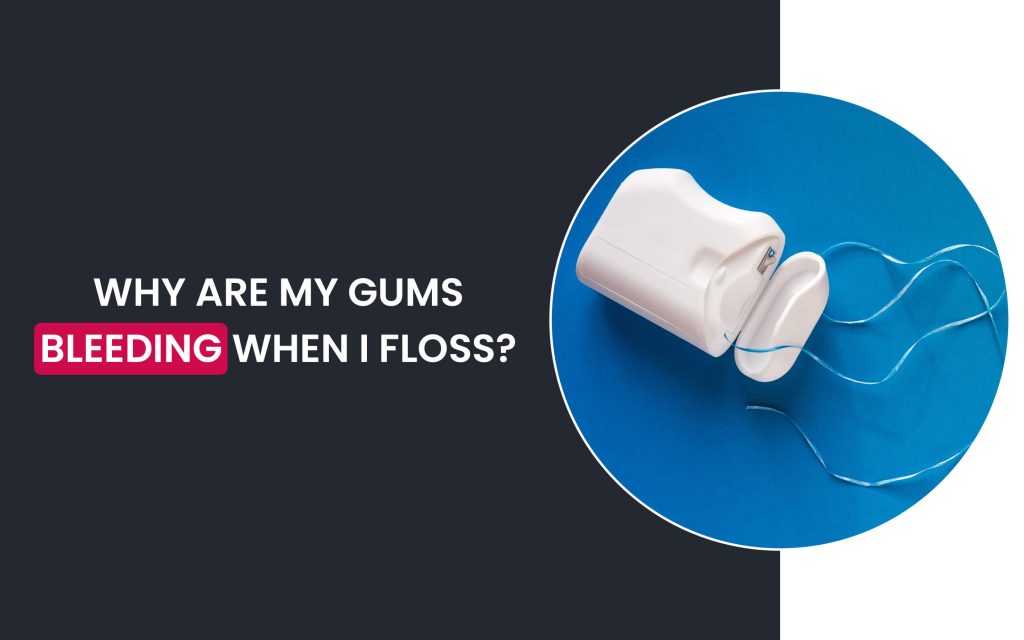Gum bleeding happens usually during tasks like brushing, flossing, or sometimes for no apparent reason. While it’s normal occasionally, ongoing or repeated gum bleeding could indicate an underlying problem that needs attention. Healthy gums shouldn’t bleed easily, so any bleeding may signal oral health issues.
So, if you’ve ever noticed your gums bleeding while flossing, it can be a cause for concern. In this blog, we’ll explore the common causes of bleeding gums, effective remedies, preventive measures, and the importance of regular dental checkups.
Table of Contents
Gum bleeding causes include:

1. Gingivitis:
Gingivitis is an early stage of gum disease characterized by inflammation of the gums. Poor oral hygiene, leading to the buildup of plaque, can cause gingivitis. Bleeding gums are a common symptom.
2. Periodontitis:
If gingivitis is left untreated, it can progress to periodontitis, a more severe form of gum disease. Periodontitis involves the inflammation of the supporting structures of the teeth, including the bone. This can lead to significant gum bleeding.
3. Aggressive Brushing or Flossing:
Brushing or flossing too aggressively can damage the delicate gum tissue, leading to bleeding. It’s essential to use a gentle technique and a soft-bristle toothbrush to avoid irritation.
4. Medications:
Some medications, such as anticoagulants or blood thinners, can increase the risk of gum bleeding as these medicines act to reduce blood clotting leading to easier bleeding through the gums . If you are taking such drugs, it’s important to inform your dentist.
5. Vitamin deficiencies:
Deficiencies in essential vitamins, particularly vitamin C, can contribute to weakened gum tissue and increased susceptibility to bleeding.
6. Hormonal Changes:
Hormonal changes during pregnancy, menstruation, or menopause can affect gum health and may lead to increased sensitivity and bleeding.
7. Smoking:
Smoking is a significant risk factor for gum disease. It can impair blood flow to the gums, weaken the immune system, and hinder the body’s ability to fight infections.
Tips on how to stop bleeding gums
1. Consistent oral care
Stick to a regular oral hygiene routine to prevent plaque buildup. Brush, floss, and use mouthwash consistently to keep your gums healthy.
2. Balanced diet
A diet rich in vitamins and minerals supports overall oral health. Ensure you’re getting enough vitamin C, which plays a crucial role in maintaining healthy gums.
3. Stay hydrated
Drinking plenty of water helps flush away bacteria and food particles, promoting a cleaner oral environment.
4. Quit smoking
Smoking is a significant risk factor for gum disease. Quitting Smoking can improve gum health and reduce the risk of bleeding gums.
5. Regular dental checkups
Schedule regular dental checkups, ideally every six months or as recommended by your dentist. Professional cleanings help remove stubborn plaque and tartar, preventing gum disease.
6. Manage stress
Chronic stress can contribute to gum inflammation. Practice stress management techniques such as meditation, deep breathing, or yoga to promote overall well-being.
7. Use a soft toothbrush
Choose a toothbrush with soft bristles to avoid damaging the gums during brushing. Replace your toothbrush or toothbrush head every three to four months or sooner if the bristles become frayed.
8. Antiseptic mouthwash
Use an antiseptic mouthwash to reduce plaque and bacteria in your mouth. Opt for an alcohol-free formula if you have sensitive gums.
9. Vitamin C supplements
If your bleeding gums are related to a vitamin deficiency, consider incorporating vitamin C supplements into your diet. Consult with your healthcare provider before starting any supplements.
10. Green tea
Drink green tea, which contains antioxidants that may help reduce inflammation and promote gum health.
11. Aloe vera gel
Apply a small amount of pure aloe vera gel to your gums. Aloe vera has anti-inflammatory properties that can help soothe irritated gums.
Importance of regular checkups:
Regular dental checkups play a crucial role in maintaining optimal oral health and preventing potential issues from escalating. Here are some key reasons highlighting the importance of regular dental checkups.
1. Early detection of issues
Regular checkups allow dentists to identify potential oral health problems in their early stages. This includes issues like cavities, gum disease, oral cancer, and other dental conditions. Early detection enables timely intervention and prevents more severe complications.
2. Professional cleanings
Professional dental cleanings performed during checkups help remove stubborn plaque and tartar that regular brushing and flossing may miss. This reduces the risk of gum disease and promotes overall oral hygiene.
3. Prevention of gum disease at early stage
Gum disease, if left untreated, can lead to significant oral health issues, including tooth loss. Regular checkups allow dentists to monitor and address early signs of gum disease, such as gingivitis before it progresses.
4.Customized oral health advice
Dentists provide personalized advice on maintaining oral health based on an individual’s specific needs. This may include guidance on proper brushing and flossing techniques, suitable oral care products, and lifestyle recommendations.
5. X-rays for comprehensive evaluation
Dental X-rays, taken during checkups as needed, provide a more comprehensive view of the oral structures. This allows dentists to identify issues beneath the surface, such as impacted teeth or bone loss, that may not be visible during a regular examination.
6. Monitoring changes over time:
Regular checkups enable dentists to monitor changes in your oral health over time. This long-term perspective helps track the progression of conditions, assess the effectiveness of treatments, and make adjustments to the oral care plan as needed.
7. Preventive treatments
Dentists may recommend preventive treatments such as fluoride applications or dental sealants during checkups to strengthen teeth and protect against cavities.
Consult a dental expert at Paradise Ridge Dentistry
The treatment for bleeding gums varies based on the underlying cause. In addition to other factors, some women may experience bleeding gums during pregnancy, a condition known as pregnancy gingivitis. This is often due to hormonal changes, particularly elevated levels of estrogen and progesterone, which can increase gum sensitivity and inflammation. The higher blood volume during pregnancy can also contribute to this issue. To manage pregnancy gingivitis, it’s essential to maintain good oral hygiene practices such as using a soft toothbrush, regular flossing, and using a mouthwash. Regular dental check-ups, consuming foods rich in vitamin C, and staying hydrated can also be beneficial. If bleeding persists, it’s important to seek advice from a dentist or healthcare provider on maintaining oral health during pregnancy.
It’s important to consult with a dentist or healthcare professional for a proper diagnosis and a personalized treatment plan. So, if you continue to experience bleeding gums despite adopting preventive measures, it’s important to consult a dental professional. If you reside in Phoenix and have bleeding gums, get in touch with dentist in phoenix 85032 at Paradise Ridge Dentistry for expert assistance. We can assess your specific situation, recommend tailored solutions, and provide guidance on maintaining optimal oral health. From regular checkups to advanced treatments, we prioritize your health, ensuring a comfortable and stress-free experience.
In conclusion, understanding the causes of bleeding gums empowers you to take proactive steps towards better oral health. By implementing proper oral care, seeking professional guidance, and choosing Paradise Ridge Family Dentistry as your dental partner, you can achieve a dazzling smile and lasting oral health well-being. Call(602) 786-5724 to schedule an appointment. Or learn more about Paradise Ridge Family Dentistry.


